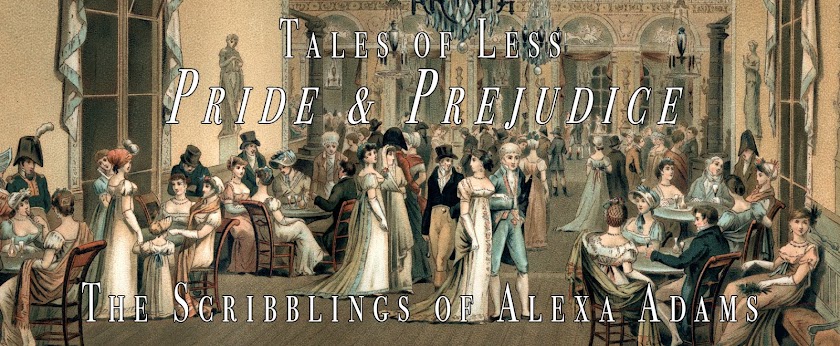Name: Elizabeth Bennet
Age: 20
Hobbies: Long walks, reading, and analyzing the foibles of her neighbors.
Most charming quality: A sharp and witty tongue
Most detrimental tendency: An inclination to judge character based upon appearance.
Greatest strength: Intelligence
Truest friend: Jane Bennet
Worst enemy: Another difficult call. I nominate George Wickham.
Prospects: Her share of the 5000 pounds her mother brought to her marriage, about 50 pounds a year.
Favorite quotations: "Lady Catherine has been of infinite use, which ought to make her happy, for she loves to be of use."
"Adieu to disappointment and spleen. What are men to rocks and mountains?"
"He is also handsome," replied Elizabeth, "which a young man ought likewise to be, if he possibly can. His character is thereby complete."
"This is the consequence, you see, Madam, of marrying a daughter," said Elizabeth. "It must make you better satisfied that your other four are single."
"If you were to give me forty such men, I never could be so happy as you. Till I have your disposition, your goodness, I never can have your happiness. No, no, let me shift for myself; and, perhaps, if I have very good luck, I may meet with another Mr. Collins in time."
Musings: What is there to say about Miss Elizabeth Bennet? Like Mary Poppins, she often seems "practically perfect in every way", but is she really? When compared with some of Austen's other heroines, particularly Elinor Dashwood and Anne Elliot, she is decidedly flawed, yet she is by far the most beloved and an eternal source of fascination to readers. Perhaps she is precisely what Austen meant when she said, "Pictures of perfection, you know, make me sick and wicked". As imperfect as Darcy is at the beginning of the novel, Elizabeth is equally so. Her prejudices are in complete control when she makes her initial assessments of both Darcy and Wickham, and they are totally premised upon how each man effects her pride. She likes Wickham because he pays her special attention, while disliking Darcy for his initial slight.When her assumptions are shattered after reading Darcy's letter, she decries her past behavior:
"How despicably have I acted!" she cried. -- "I, who have prided myself on my discernment! -- I, who have valued myself on my abilities! who have often disdained the generous candour of my sister, and gratified my vanity, in useless or blameable distrust. -- How humiliating is this discovery! -- Yet, how just a humiliation! -- Had I been in love, I could not have been more wretchedly blind. But vanity, not love, has been my folly. -- Pleased with the preference of one, and offended by the neglect of the other, on the very beginning of our acquaintance, I have courted prepossession and ignorance, and driven reason away, where either were concerned. Till this moment, I never knew myself."So she claims, but I believe that she does know how prejudiced she is all along, even if she does not acknowledge the negative repercussions of her biases. In chapter sixteen, when chatting with Wickham at the Phillips' home, she thinks to herself: "A young man too, like you, whose very countenance may vouch for your being amiable". Though the Victorians may have adored physiognomy, Austen wisely teaches us the dangers of judging character based upon appearance (Wickham, Willoughby, Mr. Elliot), and Elizabeth, with all her insight into human character, should certainly know better. Again in chapter eighteen, at the Netherfield ball, she says jokingly to Charlotte: "Heaven forbid! -- That would be the greatest misfortune of all! -- To find a man agreeable whom one is determined to hate! -- Do not wish me such an evil." While the statement is certainly a fine piece of wit, it is also acknowledgment of her determined prejudices. The reason why I love and admire Elizabeth anyway is because of her eventual willingness to acknowledge her faults and amend her behavior accordingly. It is for this same reason that I find Darcy the most appealing of all Austen's heroes. Both characters are able to be self-critical and change accordingly. It is easy to see the faults you yourself posses in others and decry them. It is far more difficult (and courageous) to turn such censure upon oneself.
Images:
http://www.jimandellen.org/austenblog/926.html
http://www.myprideandprejudice.com/2009/07/1980-pride-and-prejudice-a-review-of-the-bbc-tv-adaptation/
http://netflixcommunity.ning.com/group/yourearealcharacter/forum/topics/character-barrel-of-monkeys
http://www.theage.com.au/news/film-reviews/pride-and-prejudice/2005/10/20/1129775887719.html





Some great quotes here, Alexa, and an insightful conclusion. I agree that being 'self-critical' and willing to make amends is ultimately what makes the pair very likeable. Interestingly enough, Emma's willingness to change is also her most redeeming quality. Do you think you can extend this to any of JA's other characters? Might be a topic to pursue in another post.
ReplyDeleteHi Monica! Great to see you here! I complete agree with you regarding Emma, and I believe the same can be said of Marianne. When I began these profiles, I intended to just do the heroines. Then I decided to continue with the heroes, then the rogues, then the matrons, etc. We'll see if I don't run out of steam. Next on the list is Fanny Price, who I'm wildly excited to defend (I'm one of the few people who actually likes the poor girl). I'd love to hear more of your thoughts as I proceed!
ReplyDelete